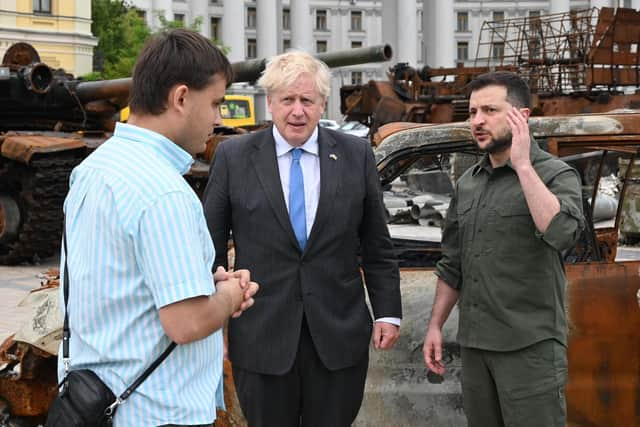The perils of 'Ukraine fatigue' as Putin gambles on NATO collapse - Patrick Mercer
And I suppose that’s exactly what is meant by “Ukraine fatigue”.
We first saw signs of the West getting tired of the reality of this war back in early April.


Advertisement
Hide AdAdvertisement
Hide AdIt took a few weeks for it to dawn on the EU that no matter how laudable, the sanctions imposed upon Russia were going to have serious repercussions for the US and European economies, especially as they came hard on the heels of the ruinous financial policies adopted during the Covid crisis. So, the EU Commission’s President and Poland’s Andrzej Duda went to see Mr Zelensky in Kyiv followed by Chancellor Nehammer of Austria and then, completely separately, our own Prime Minister.
Now, we cannot know what was discussed in private, but it’s been suggested that Ukraine’s President was being edged towards some sort of truce with Moscow by his visitors until Mr Johnson appeared.
It seems that the PM’s task was to harden President Zelensky’s resolve and persuade him to keep to the Washington-London path of righteousness.
Certainly, any sign of negotiations between Kyiv and Moscow quickly evaporated.
Advertisement
Hide AdAdvertisement
Hide AdSomething similar then happened last week: Emmanuel Macron, Olaf Scholz, Mario Draghi of Italy and Romania’s President descended on Kyiv.
Most of these countries are known to be keener on a negotiated settlement than the hawkish Anglo-Americans – bearing in mind that the EU has lapped-up 61 per cent of Moscow’s fossil-fuel exports since the start of the war with French imports of Russian gas actually rising.
Similarly, Italy has secured concessions from EU sanctions whilst Germany has played fast and loose after dramatically announcing a whopping increase in defence spending and then quietly failing to send very much hardware at all to aid Ukraine.
There were certainly discussions about admitting Ukraine to the EU, but the conditions set – such as Kyiv’s fighting internal corruption more vigorously or being at peace – seem deliberately difficult and slow to achieve. Talk is cheap, of course, with the actual admittance of Ukraine looking increasingly remote: Russia, after all, must not be provoked.
Advertisement
Hide AdAdvertisement
Hide AdThere was some salve, though: the European leaders did agree to send six more self-propelled guns to Kyiv – a whole six!
But this handful of howitzers was set against the Ukrainian government’s announcement that it’s losing about 800 troops a day – and that’s only in the Donbas – whilst the country’s own supply of ammunition is all but exhausted.
Kyiv is not mincing its words: more NATO munitions are absolutely critical if resistance is to continue.
Then, just like April, in shambled our Mr Johnson.
The trip was at short notice – he even jacked on an important levelling up conference in Doncaster and, up until then, failed to visit Wakefield before its by-election.
Advertisement
Hide AdAdvertisement
Hide AdIt was all so predictable: boosterish jingoism to counteract the weedy appeasers and even a promise of a package that would train 10,000 troops every four months for Kyiv’s army.
It seemed that spines were stiffened until someone did the maths and realised that these recruits would soon disappear into the chasm left by their dead, fled or wounded comrades.
Yet, the PM continued with his mission in an article suggesting that, “Time is the vital factor… Our task is to enlist time on Ukraine’s side.”
I wonder if this isn’t playing directly into Russia’s hands, though? Unquestionably, the Kremlin wanted a quick victory back in February, but when that failed bloodily, their slender force (never more than 200,000 attacking about 600,000) was mainly switched to concentrate against the heavily fortified Donbas.
Advertisement
Hide AdAdvertisement
Hide AdThe numbers should have favoured the defenders, yet Russia is making significant progress there with Kyiv telling us how desperate the situation has become against relentless artillery strikes and a critical need for more NATO material.
Of course Russia is suffering too, but I suspect they have a larger prize in mind than just the destruction of Ukraine’s army. During Britain’s last tussle with Russia in the Crimea, Tsar
Nicholas invoked his greatest allies, Generals January and February, and I wonder if the same gentlemen might not be saddling up once again?
Russia’s wagering that cold weather will cause chaos in the West with rolling blackouts, limited production from our factories, strikes and sky high energy bills that will cripple service economies with people having little or no disposable income to spend on discretionary goods.
Advertisement
Hide AdAdvertisement
Hide AdWill democratic leaders allow their people to go cold and hungry and then suffer at the ballot box, or will countries like France, Germany and Italy defy the wishes of America and the bonds of the EU?
If they do, how will the other European countries and their allies respond?
It’s a mistake to believe that President Putin is some strategic genius, but I think he’s prepared to gamble that sustained fighting will cause serious NATO discord which, he hopes, will lead to its collapse.
Whilst our leaders are quite right to say that fatigue with this war is extremely dangerous, Mr Johnson is wholly wrong to talk about buying more time. More time means more death and more fatigue whilst more time brings Russia’s icy generals ever closer to the battlefield.
- Patrick Mercer is a former Conservative MP for Newark and Army colonel.
